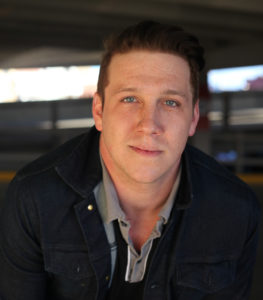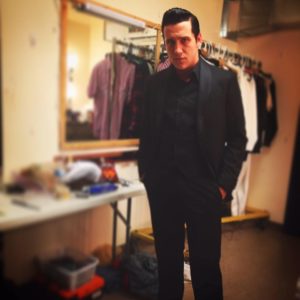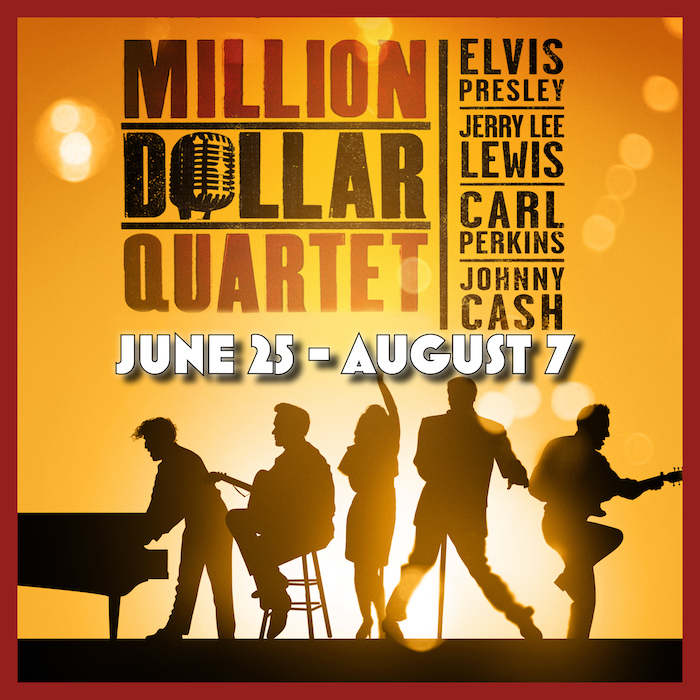Everybody’s got the fever, that is something you all know. Fever isn’t such a new thing. Fever started long time ago! And the fever is spreading like a burning ring of fire! The fever is spreading like great balls of fire! The fever is rocking its way into the Infinity Theatre Company this summer as Million Dollar Quartet sets to open this weekend, now in repertory with Almost Heaven: Songs of John Denver. In a TheatreBloom exclusive interview, we sit down with the magnificent ‘million dollar quartet’ and talk all about the fever— the fever of music and how it forever changed the lives of Carl Perkins, Jerry Lee Lewis, Elvis Presley, and Johnny Cash.
Thank you fine four fellas for sitting with us today. If you would give us a quick introduction of who you are and who you’re playing, we’ll get started straight away.
Austin Wayne Price: My name is Austin Wayne Price and I play Johnny Cash.
JP Coletta: My name is JP Coletta and I play Jerry Lee Lewis.
James Bock: I’m James Bock and I play Carl Perkins.
Travis Artz: My name’s Travis Artz and I play Elvis Aaron Presley.
What is it like getting to take on this iconic roles?

Austin: Johnny, for me personally, is really important to me. His music is really important to me. I feel like I have a job to do there for myself to pay homage to him. But it’s just great to watch these people, especially the ones that grew up in this era with this music, you get to watch them just light up when this kind of thing happens. You bring them back in a time machine to their youth and that’s really cool.
JP: For me it’s kind of the opposite because I didn’t know who Jerry Lee Lewis was before I got this job. So I was kind of learning on the fly about all these icons. I’ve never been a part of this world. It was really, really interesting for me to just jump in and learn everything that I know through research. Rather than learning by watching what he did, I started off reading about him, and learning about what kind of person that he was and I think that’s interesting.
James: I think our job is really interesting and unique in that these were real people. They were not exclusively the icons that we’re used to seeing little clips of, these little live performance bits that we see in them. When you have a book musical like this, you have people who serve the story for that moment in time for the audience and you also have these icons who you’re trying to portray with enough respect to who they actually were and the way that they presented themselves. We find biographical bits that don’t mean anything within this context, and we’re able to discard those and use what we need in order to create the best possible story here. The pressure is kind of off to be impersonators because there are people out there who are better than us at that. There are people who get paid to do that. We actually get to create the guy behind that who was hanging around a studio with his buddies. We get to put those people on stage. It’s more fun than trying to just impersonate.
Travis: I couldn’t have said it better myself. Just remember that they’re real people. When you step on stage, just think about the relationships they had with these other characters within that world within that time. Just play what’s in front of you. That’s it.
What would you say has been the biggest challenge in taking on a role like this in a show like this?
Austin: I think definitely drawing the line— not even drawing the line—
JP: Walking the line.
Austin: Ha! Yes, walking the line, right. But knowing the difference between being an impersonator and being the human and not allowing ourselves to become that sort of impersonating style of acting. It’s challenging to really try and stay true to who they were and what they were going through as humans in their lives. This time for them was the beginning of long, long friendships for all of them. It was a challenge for me personally to bring John down to earth and play a human and not an icon.

JP: Same thing. It’s stripping away the iconicism, that idol status of who they were, peeling that away to discover who they really were as a person. What’s interesting for me is that Jerry Lee wasn’t a star yet. But Jerry Lee, even in his interviews, always had to keep up this persona of “The Killer.” There’s this great story about this one time he had this interview, and the interviewer had to cover his eyes while Jerry came through the house so he could up and change and come out and be seen as “The Killer.” This show is before “The Killer” existed. So it’s very interesting to strip that down and find Jerry the man before “The Killer” persona set in.
James: Probably the greatest challenge for me so far is that there’s something seminal about this that we haven’t ever experienced as a generation. We think of it as classic. We think of it as a piece of Americana almost. For them it was new. For them it was rebellious, it was cutting edge, it was exciting. For a lot of these guys they were rebelling against their poverty and their economic circumstances and their lot in life. Finding that even in musical terms— even the technicality of juicing up the music in a sense to make it exciting enough for a modern ear so that it plays as energetically as it would have in that time— has been difficult. Some of the guitar solo work, if I did it the way that he did it, it wouldn’t sound as new or fresh and exciting. I kind of have to fuse modernity with what was new and cutting edge back then. I think for all of us that’s a challenge, trying to find that life in the music.
Travis: I think despite what we all just said about not trying to be impersonators and not play the icon, there are still certain things that people expect to see when they see Elvis on stage or when they see Johnny Cash on stage. So also honoring the physicality, how they talked, how they performed, and knowing when and where that needs to be sprinkled in has been challenging, but that’s how they performed.
Austin: One thing our Director Tommy (Co-Director Tommy Iafrate) tried to instill in us early on was that remember we are playing these guys but also to remember how Travis plays Elvis or how Austin plays John and so on and so forth.
Travis: It’s going to be different in our bodies than it was in theirs.
Austin: It’s one of those things where we’re going to keep exploring and it’s going to change nightly.
James: It was subtle but it was also one of those defining moments when Tommy asked us “what makes your character stage worthy?” If you weren’t a rock-and-roll icon, if you weren’t the father of rockabilly, what would make your character worth being in this story? That was important for us to consider.
Travis: The way it’s written, the world we’re coming into with the way it’s written, we’re all here to accomplish something. We’re all here to get something from the other characters. We’re not here to be icons, we’re here with objectives and goals.
JP: The music is just a platform for that.
Austin: It’s a portal. The music, I feel, is each of their individual portals into each other’s lives. We’re playing some things in the show that was from the original recording, but a lot of these big tunes that were popular they get worked in. Like “That’s Alright,” for me as Johnny Cash, to get to play that song with Elvis, we really use the music as— and I’m going to use the word portal again— but we use the music to get into each other and into each other’s lives and souls. Feeding off of that friendship and brotherliness, there’s a big family aspect to it.

James: If we’ve done our jobs well, people who think they’re just going to come hear a musical revue or who might think they’re coming to see a rock show— and it is that so they will leave satisfied there— but they’ll leave with an idea of the complexity of the dynamic of this quartet. All of the dynamics are interpersonal. The way that Carl relates to Elvis even effects the way Carl relates to Elvis with John in the room.
Austin: It’s exciting too for the audience, I think, especially in a space like this, it’s really intimate. You are really getting to be a fly on the wall and first hand you’re there in the studio. I think the audience is going to discover a lot of things they didn’t know about these guys. James said it best, they’re going to be satisfied with what they came for, but I think it’s the thought-provoking conversations happening in the show are going to spark conversations in the audience as they’re driving home. They might say things like “I had no idea that this conflict was happening. I had no idea that they felt this way about this thing.”
Travis: Like Carl Perkins wrote “Blue Suede Shoes.”
JP: The show is a PSA for Carl Perkins.
Do you have a favorite song in the show or a song that really speaks to you?
JP: I mean it’s kind of pompous to say it but I love me some “Whole Lotta Shakin’ Going On.” That’s my favorite thing to do.
Austin: My favorite moment in the entire play is getting to do “Peace in the Valley.” That is an extremely intimate moment and we have just come out of a really great scene where we all realize that we have this thing in common that we didn’t know. Each of their relationships with God were very important in their lives in one way or the other. That’s my favorite moment, getting to bring them back down to earth. Now we bring all of them back down to earth a little bit throughout, but as Austin, for me, that’s an extremely incredible moment.
James: The shadow of what’s to come just hangs over the whole show. The degree to which these people depart from or reconcile with their faith over the course of their lives, hopefully there’s enough of an awareness of that in the audience so that they can connect with where each one is at this moment in their life. All the music is really good. I actually like the other spiritual that we do, “Down by the River.”
JP: I love that one.
Travis: Me too.
Austin: That one’s awesome.
James: For me it encompasses their roots as well as what they were bringing to music at the time. It’s really a great fusion, rockabilly spirituals.
JP: That song just dramatically is such a fun moment because that is really first moment where we all bond and become this unit—
James: The million dollar quartet.

Travis: I have a really good time during “Let’s Have a Party.” There’s something really fun about that number, I think because everyone’s really on board. There are a few other moments where that happens in the show but that one just feels so strong.
Austin: It’s a perfect example of how the music helps them all to stop thinking about the trials and tribulations that they’re going through and we just lose ourselves in the music.
Travis: There’s a lot of reconciliation in their jamming. There’s a lot of drama around it in terms of how they’re dealing with each other and their careers, but then they just kind of come together on the music and that’s what makes something like that number really fun.
What has taking on this show taught you about yourself as an actor and as a human being?
Austin: Well, I’ve been aspiring to do this show for a long time now. Being here and doing it has been an eye-opener for me. I don’t know if I can pinpoint an exact thing, and I know I’ll learn more as we go, but I do know I have learned a lot about myself as an actor and as an actor-musician. Even just in this last week of throwing the show together I’ve learned so much. I can’t really put my finger on what the word is but there is definitely a newness to what I thought I already knew about myself. I’m getting new little surprises happening every day while we’re doing this. And I’m realizing I’m going to have to apply this feeling more and more and more in my work and in my craft.
JP: I guess for me, I never knew I could be an actor-musician. I knew I played piano. I knew I went to school for musical theatre. This was really eye-opening for me. It exposed me to this really, really cool community of actor-musicians. I’ve also learned that I really love this music. I didn’t really know it before, but coming into it I fell in love with this old school rock-and-roll.
James: Something I think we as performers can connect with is that there’s— and this is if we’re all honest with ourselves— there is a certain level of notoriety that we’d all like to reach as performers. The ones who reach the greatest levels of notoriety had the hardest time coping with it. Carl Perkins later in his life was just a person full of gratitude. He ended up saying on more than one occasion, “I wasn’t meant for that. I wasn’t meant for that level of fame, and I’m very grateful for the way that my career actually turned out.” Of course that’s me paraphrasing, but that’s a huge reminded to find gratitude in every breath every day. These characters really are in that moment of tension. Either they’ve reached that level of fame and are struggling to cope or they’re aspiring to that level of fame and are resentful of not having it yet. Or maybe it’s too early to be resentful but they still have that basic arrogance. Again, knowing what’s to come for all of them is eye-opening; it sheds a lot of light on the moment.
Travis: Doing this show has allowed me to give myself permission to have fun and be more care-free. When you’re playing a character like Elvis, especially when we get to the end do the concert, you just have to be able to let loose with the movement. He was physically connected to the music. Even when he was jamming in a place where there was no audience, people talk about how he couldn’t help himself moving. People said when he was standing still and not playing music he would tap his finger, he would shake his leg, and just keep moving. Giving myself permission to not care about how I look when I’m playing either in the studio or at the concert at the end and really go for it, it’s been a lesson for me. I’m just really going for it and trying to embody what he did. It’s going to look how it’s going to look but I’m going to have fun doing it.
If you could ask Johnny Cash, Jerry Lee Lewis, Carl Perkins, and Elvis Presley one question, what would you ask them?

Austin: Damn. Oh man. Well, I think I’d ask him how I did. I think I’d just have to say, “How’d I do, man?” And hope that he would be pleased.
JP: Come back to me.
James: On the spot, and I may amend this later, but I think I would like to know what it like to be the creator of the sound. We’re in such a place where there’s access. Technology has come such a long way and there’s a lot of repurposing and a lot of synthesizing. There’s not a lot of inventing going on. What was it like when the radio was just coming around to take an instrument and craft a new sound that was really born out of new circumstances? And then to carry that sound to national and international providence, that doesn’t happen anymore and I want to know what that was like.
JP: Mine’s kind of actually similar. I would just want to know where did it come from? Nobody had ever played the piano like that before.
Travis: Yeah, where did it come from? Though I think it might actually be “How in the world do you move your hips like that?” It’s not even a joke. It’s similar to what JP said, where did it come from? Because I’ve been studying it and trying to replicate it in my own way in my body but it was really something else. I’ve never seen anyone else move like that. And it’s not choreographed it’s all on the spot. The way he moved, it’s like he was…like he was…
Austin: Possessed.
Travis: Yeah, possessed. His body just did this thing on its own.
James: He kind of invented sexy. We still think of that kind of sensuous movement today as being sexy. Before that Bing Crosby was “sexy” but a little bit more square.
Travis: But there’s definitely a skill to it. It’s something he had to have developed because there is precision but it’s also so loose.
Why should people come to see Million Dollar Quartet?
Travis: To see how I move my hips.
Austin: I think to get to have an experience that you will never get to have again in any other theatrical setting.
JP: Everything that we do up there— we’ve rehearsed it and rehearsed it— but it’s all very spontaneous. It’s different every time. So whatever show you come to that’s your experience and no one else can have that.
James: There is something in this show for everybody. Whether you just want to tap your foot or enjoy some really significant music that changed music history as we know it, just come on over and hopefully we’ll do it well. Also for people who love theatre and who love storytelling, this isn’t a typical musical revue, this is a book musical. Not a lot of people are able to take a body of work like this and turn it into a compelling story and it really is. For people who don’t think they like typical musical revues it’s not a typical musical revue. And for people who don’t think they like typical theatre, this is not typical theatre. Come see it!
Million Dollar Quartet plays in rotating repertory with Almost Heaven: Songs of John Denver through August 7, 2016 at Infinity Theatre Company at The Children’s Theatre of Annapolis Complex— 1661 Bay Head Road in Annapolis, MD. For tickets call the box office at (877) 501-8499 or purchase them online.

